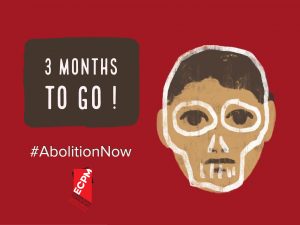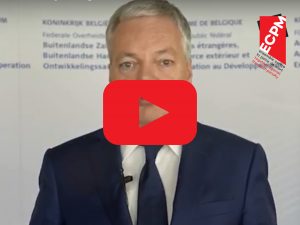7th World Congress Against the Death Penalty, 3 months to go
26 November 2018
ECPM invites you to meet us in Brussels on February 26th 2019 for the 7th World Congress against the Death Penalty!
 The World Congress against the Death Penalty, an essential meeting of abolitionist activists, encourages countries to make concrete commitments, mobilizes public opinion and helps to develop common strategies. For its 7th edition, the Congress will be held in Brussels, the European capital, from February 26th to the 1st of March 2019. It is organised by ECPM in partnership with the World Coalition Against the Death Penalty and under the sponsorship of Belgium, the European Parliament, Switzerland and the European Union. Join us!
The World Congress against the Death Penalty, an essential meeting of abolitionist activists, encourages countries to make concrete commitments, mobilizes public opinion and helps to develop common strategies. For its 7th edition, the Congress will be held in Brussels, the European capital, from February 26th to the 1st of March 2019. It is organised by ECPM in partnership with the World Coalition Against the Death Penalty and under the sponsorship of Belgium, the European Parliament, Switzerland and the European Union. Join us!
For more details on the provisional programme, see the official website of the 7th Congress
4 days, 5 locations, 115 countries represented and more than 1500 abolitionists expected
The 7th World Congress against the Death Penalty will take place over 4 days. February 26th will be dedicated to the many side events organised by abolitionist actors from all over the world. The solemn opening ceremony will be held in the prestigious premises of the European Parliament. This event will strongly mark the very high level of political involvement that supports the abolitionist movement. At the rhythm of plenary sessions, round tables, workshops and cultural events, the 1500 abolitionists expected will have a unique opportunity to come together and take stock of the progress and difficulties along the path towards universal abolition. Community activists, lawyers defending death row inmates, political leaders, diplomats, parliamentarians, former death row inmates or families of victims will share their analyses, identify the levers for action and appropriate them in order to increase their effectiveness. Among the guests will of course be the honorary president of ECPM, Mr Robert Badinter, but also many political figures, such as Mrs Federica Mogherini, High Representative of the European Union for Foreign Affairs and Security Policy, Vice-President of the European Commission and Didier Reynders, Deputy Prime Minister and Minister for Foreign and European Affairs of the Kingdom of Belgium. We will also be honored by the presence of United Nations Special Rapporteurs, as will the Nobel Peace Prize and the Sakharov Prize. The Belgian capital, which is also the capital of Europe, will be a prime host for this 7th Congress. It has many political representatives, is central and attractive, providing an opportunity for high-level advocacy. Brussels has all the assets to position itself as the spearhead of the abolitionist movement. Delegates will see this for themselves by visiting various locations throughout the programme. First of all, the European Parliament will host the opening ceremony (hemicycle) and an exhibition (Menuhin Hall); in the library of the Egmont Palace will be held the network evening; the Fine Art Palace in Brussels, Bozar, will provide an exceptional setting for the closing ceremony as well as the evening of testimonies; you will have to go to the Tanneurs Theater to attend the performance of “Suzy et Frank”, and to the Galeries Cinema for the screening of “Lindy Lou, juror n°2”. Of course, other outdoor events will be held in the city, including the World March for Abolition.
 Click to listen to the invitations of Federica Mogherini and Didier Reynders
Click to listen to the invitations of Federica Mogherini and Didier Reynders
Africa, the next abolitionist continent ?
In April 2018, prior to the World Congress, the African Congress against the Death Penalty was held in Abidjan, Côte d’Ivoire. This year, the focus will therefore be particularly on Africa, in order to best support the countries of the continent towards abolition. Of the 55 member States of the African Union, 20 are abolitionist, 1 is abolitionist for ordinary crimes, 22 are under moratorium and 12 are retentionist. Things have been moving very positively in recent years, and Africa is expected to be the next abolitionist continent.An evening of testimonies
ARTHUR JUDAH ANGEL, former death row inmate, Nigeria Arthur Judah Angel, who was sentenced to death in Nigeria for murder in 1986 at the age of 21, has always denied that he had committed the crimes for which he was accused. This artist, incarcerated in Enugu prison (Nigeria), lived in particularly difficult conditions: he had to face cancellation at the last moment of his execution date and witnessed 58 executions carried out on the same day. He was finally released in 2000, after 16 years in prison, including almost 10 years on death row. LINDY LOU ISONHOOD, former juror in a trial leading to an execution Lindy Lou Isonhood is an American from Mississippi who was sworn in at a trial leading to the death sentence and execution of a man twenty years ago. She has since lived with an unbearable sense of guilt, and no one in her Republican and Protestant community has understood her distress. In 2006, Lindy Lou met this convict, Bobby Wilcher. She became his friend and remained so until the day of his execution. Today, she is the heroine of Florent Vassault’s documentary Lindy Lou, juror n°2. We follow her at the beginning of a journey that will lead her to meet the other eleven jurors in this trial. Thanks to this journey, she was finally able to ask herself this fundamental question: “Are we seeking revenge or justice? » NDUME OLATUSHANI, former death row inmate, United States Ndume Olatushani spent 28 years in prison, including 20 years on death row in the United States, for a crime he did not commit. After countless appeals, his sentence was commuted in 2004 to life imprisonment. He was released after entering the Alfort plea: he renounced his innocence, which allowed him to be released immediately, but he is still considered guilty despite his innocence. Saved by the discovery of drawing and painting, supported throughout his detention by his relatives and abolitionist organisations, he continues today to be engaged strongly with young people against the death penalty. PETE OUKO, former death row inmate, Kenya Sentenced to death for murder in 2001 at the age of 31, Pete Ouko, then father of two young children, has always claimed his innocence. Detained for nearly eighteen years in a cell with thirteen other prisoners, he now testifies at 11:30 p.m. out of 24 to the difficulty of surviving until his execution, under particularly complicated conditions. He was pardoned and released on October 26th 2007 and now holds a law degree from the University of London. He is involved in defending the rights of prisoners in Africa through the Youth Safety Awareness Initiative, of which he is the founder and director. Initiated and organised by ECPM since 2001, the World Congresses against the Death Penalty mark the highlight of the global abolitionist campaign every three years. They are federating more and more abolitionists around the world. Join us!





